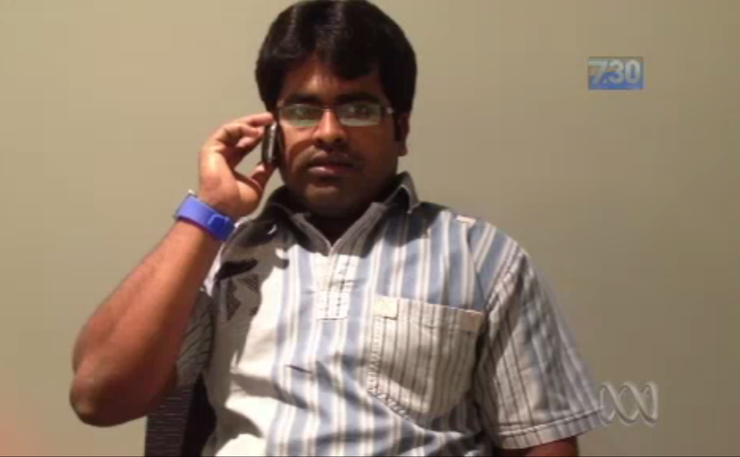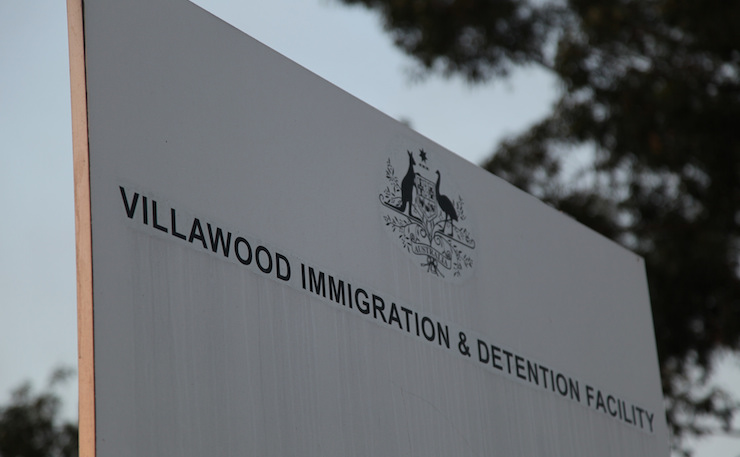One by one, refugees initially assessed by ASIO as a security risk are being released. Advocates and lawyers are now demanding a simple question be answered – why were they held so long? Max Chalmers reports.
One of Australia’s most opaque and internationally criticised immigration detention policies appears to be running down, with advocates saying only a small number of people indefinitely detained on the basis of a negative ASIO assessment remain in detention, and calling on the government to compensate those who have been held and released.
The policy has seen a small group of people, around 50 by late 2013, detained in mysterious circumstances after they were found to be refugees but handed an ‘adverse security assessment’ by Australia’s spy agency ASIO.
Lawyers and supporters have long argued the group, mostly members of Sri Lanka’s minority Tamil community, pose no risk of harm to the community, and are pointing to the fact many have been quietly released from detention as proof that ASIO now acknowledges that is the case.
The Department of Immigration has declined to confirm the exact number who remain held, passing inquires from New Matilda on to the Minister for Immigration Peter Dutton’s office which, so far, has ignored them. But advocates in regular contact with those detained say their number could now be less than ten.
Just nine days ago one of the most well-known among them was released.
Tamil refugee Ranjini was handed an adverse ASIO assessment in 2012 and returned to detention. Like others in this situation she had been found to have a genuine and well-founded fear of persecution. It didn’t matter: the adverse assessment she received trumped all else.
The mother of three had fought with Tamil Tiger forces (LTTE) in the late 1990s in Sri Lanka and engaged in the armed resistance. As a result, she feared being raped by government forces.
Detained with her in Villawood, her children had their lunch boxes checked by security guards every day on the way to school. Ranjini’s first husband was killed in Sri Lanka, now her new partner was left on the other side of a fence.
Trevor Grant, from the Tamil Refugee Council, noted Ranjini’s youngest son will turn three in January but until Friday had not known life “beyond the razor wire”.
But Aran Mylvaganam, also involved with the Council and a regular visitor to refugees held in Melbourne’s Broadmeadows detention centre, said other Tamils in a similar position to Ranjini are also slowly being released.
“It has been pretty much one by one, and it’s been gradually going down,” he said.
Both men say refugees have not been given an explanation as to why ASIO has changed its mind on their security assessments.
For those held under these circumstances it’s a pressing question. After years in detention, which spread out indefinitely before them until ASIO started to reverse its decisions, a substantial amount of damage has been done.
Among the cohort incidents of self-harm and suicide started to mount. Their limbo dragged on. Mylvaganam saw the impact firsthand.
“Quite a lot of them I have known as healthy people and slowly I saw their mental health deteriorate over time,” he said. “There’s one guy out of those still in detention… his mental health has deteriorated to the point where he can stay awake for five days in a row without sleeping tablets. He has been in a mental health hospital for over two months [at a time].”

In 2013 Australia was blasted by the United Nations for the treatment of ‘adverse security assessed’ refugees. The UN Human Rights Committee said the practice amounted to cruel, inhumane and degrading treatment, and was responsible for inflicting “serious psychological harm”.
The Committee found Australia had breached around 150 international human rights principles. It recommended the men and women be offered rehabilitation and compensated for their time in detention.
Ben Saul, an expert in international law at the University of Sydney who advocated for those with adverse ASIO assessments at the UN, said the government should now look at compensation as well as legal reform to end indefinite detention.
“I think that’s something for the refugees and their individual lawyers now to talk to the government about,” he said. “You would hope there would be some kind of appropriate recognition of the harm they’ve suffered.”
Aside from the cost of integrating into the community, those detained will need ongoing psychological assistance as they try to adapt to normal life, something Mylvaganam says compensation could help cover.
At the time of the UN hearing all bar four of the 46 refugees detained in this manner were Tamils, most of whom arrived in Australia around 2010.
Saul said his clients had been given little to no reason as to why they had been labelled a security risk. Though more information about the allegations against them was made accessible after Labor appointed an independent reviewer to look at their cases in late 2012, Saul said there was still not enough evidence open to lawyers to allow them to mount challenges against the assessments.
According to Saul the adverse assessments given to the group were “strange” and “abusively cautious”.
“I saw no evidence that any of these guys had been involved in terrorist attacks or plots against civilians,” he said.
“I think our security agencies have bigger fish to fry and I’d hope their resources are being dedicated to looking at serious terrorist threats to Australia like Islamic State.”
The Tamil Tigers were destroyed as a fighting force by the Rajapaksa government in 2009 during the bloody final weeks of the country’s civil war. Both LTTE forces and the Sri Lankan government stand accused of serious crimes of war, with the government alleged to have herded civilians into safety zones which were then shelled indiscriminately.
Despite that, Australia has worked closely with the Sri Lankan government to help prevent Tamils fleeing the country after the conflict ended.
Speaking to the ABC last year the woman charged with reviewing ASIO’s assessments, Margaret Stone, gave a hint as to why those who escaped had been judged an ongoing threat. “It’s important not to conflate the defeat of the Tamil Tigers in May, 2009 with the defeat of the aims and ideals,” she told 7:30.
“The interesting question for me,” said Saul, “is why are they being released now?”
One potential explanation is that Stone’s position as Independent Reviewer of Adverse Security Assessments was only introduced in 2012. It’s possible she has simply been slowly working through the cases since then. Stone was moved on from the position this year, bumped up to Inspector-General of Security and Intelligence, and replaced by the controversial former public servant Robert Cornall. The Coalition vowed to destroy the role before the 2013 election but backed off last year.
The other explanation, it would seem, is that ASIO itself decided its initial assessments were off. While only inclined to provide vague public comment, the agency makes a basic point: the world changes, and new information can change a case.
In response to questions put by New Matilda a spokesperson for ASIO said the organisation issues assessments based on “its knowledge and information available at the time and in the context of the security environment at the time”.
“ASIO reviews security assessments when new information comes to light,” they said.
New information, they noted, can relate to individual or external factors including changes in the security environment, and can be obtained from visa applications, the Department of Immigration, “investigative work”, and international and domestic partners.
A question putting it to the organisation that it had been – in Saul’s words – “abusively cautious”, received no direct response.
Donate To New Matilda
New Matilda is a small, independent media outlet. We survive through reader contributions, and never losing a lawsuit. If you got something from this article, giving something back helps us to continue speaking truth to power. Every little bit counts.





